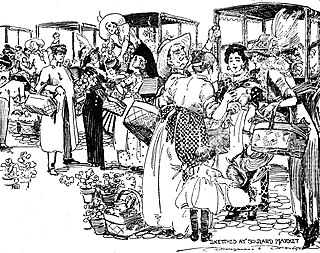Customer relationship management (CRM) is a process in which a business or other organization administers its interactions with customers, typically using data analysis to study large amounts of information.
In marketing, product bundling is offering several products or services for sale as one combined product or service package. It is a common feature in many imperfectly competitive product and service markets. Industries engaged in the practice include telecommunications services, financial services, health care, information, and consumer electronics. A software bundle might include a word processor, spreadsheet, and presentation program into a single office suite. The cable television industry often bundles many TV and movie channels into a single tier or package. The fast food industry combines separate food items into a "meal deal" or "value meal".

In promotion and advertising, a testimonial or show consists of a person's written or spoken statement extolling the virtue of a product. The term "testimonial" most commonly applies to the sales-pitches attributed to ordinary citizens, whereas the word "endorsement" usually applies to pitches by celebrities. Testimonials can be part of communal marketing.
The Better Business Bureau (BBB) is a private, 501(c)(6) nonprofit organization founded in 1912. BBB's self-described mission is to focus on advancing marketplace trust, consisting of 97 independently incorporated local BBB organizations in the United States and Canada, coordinated under the International Association of Better Business Bureaus (IABBB) in Arlington, Virginia.
Marketing communications refers to the use of different marketing channels and tools in combination. Marketing communication channels focus on how businesses communicate a message to its desired market, or the market in general. It is also in charge of the internal communications of the organization. Marketing communication tools include advertising, personal selling, direct marketing, sponsorship, communication, public relations, social media, customer journey and promotion.

Online shopping is a form of electronic commerce which allows consumers to directly buy goods or services from a seller over the Internet using a web browser or a mobile app. Consumers find a product of interest by visiting the website of the retailer directly or by searching among alternative vendors using a shopping search engine, which displays the same product's availability and pricing at different e-retailers. As of 2020, customers can shop online using a range of different computers and devices, including desktop computers, laptops, tablet computers and smartphones.
The Kano model is a theory for product development and customer satisfaction developed in the 1980s by Noriaki Kano, which classifies customer preferences into five categories.

The Financial Ombudsman Service is an ombudsman in the United Kingdom. It was established in 2000, and given statutory powers in 2001 by the Financial Services and Markets Act 2000, to help settle disputes between consumers and UK-based businesses providing financial services, such as banks, building societies, insurance companies, investment firms, financial advisers and finance companies.

A business can use a variety of pricing strategies when selling a product or service. To determine the most effective pricing strategy for a company, senior executives need to first identify the company's pricing position, pricing segment, pricing capability and their competitive pricing reaction strategy. Pricing strategies and tactics vary from company to company, and also differ across countries, cultures, industries and over time, with the maturing of industries and markets and changes in wider economic conditions.
Payment protection insurance (PPI), also known as credit insurance, credit protection insurance, or loan repayment insurance, is an insurance product that enables consumers to ensure repayment of credit if the borrower dies, becomes ill or disabled, loses a job, or faces other circumstances that may prevent them from earning income to service the debt. It is not to be confused with income protection insurance, which is not specific to a debt but covers any income. PPI was widely sold by banks and other credit providers as an add-on to the loan or overdraft product.
A touchpoint can be defined as any way consumers can interact with a business organization, whether person-to-person, through a website, an app or any form of communication. When consumers connect with these touchpoints they can consider their perceptions of the business and form an opinion.
The service recovery paradox (SRP) is a situation in which a customer thinks more highly of a company after the company has corrected a problem with their service, compared to how they would regard the company if non-faulty service had been provided. The main reason behind this thinking is that successful recovery of a faulty service increases the assurance and confidence from the customer.
Consumer protection is the practice of safeguarding buyers of goods and services, and the public, against unfair practices in the marketplace. Consumer protection measures are often established by law. Such laws are intended to prevent businesses from engaging in fraud or specified unfair practices to gain an advantage over competitors or to mislead consumers. They may also provide additional protection for the general public which may be impacted by a product even when they are not the direct purchaser or consumer of that product. For example, government regulations may require businesses to disclose detailed information about their products—particularly in areas where public health or safety is an issue, such as with food or automobiles.
Ombudsmen in Australia are independent agencies who assist when a dispute arises between individuals and industry bodies or government agencies. Government ombudsman services are free to the public, like many other ombudsman and dispute resolution services, and are a means of resolving disputes outside of the court systems. Australia has an ombudsman assigned for each state; as well as an ombudsman for the Commonwealth of Australia. As laws differ between states just one process, or policy, cannot be used across the Commonwealth. All government bodies are within the jurisdiction of the ombudsman.
The Ombudsman for Banking Services and Investments (OBSI) is the Canadian external dispute resolution organization whose responsibility is to handle the financial disputes of consumers and small businesses that could not be resolved by the customers and the financial firms on their own. The OBSI provides the service on an impartial and independent basis, and free of charge to the consumer as an alternative to the legal system.
Eight dimensions of quality were delineated by David A. Garvin, formerly C. Roland Christensen Professor of Business Administration at Harvard Business School, and may be used at a strategic level to analyze product quality characteristics. Garvin, who died on 30 April 2017, was posthumously honored with the prestigious award for 'Outstanding Contribution to the Case Method' on 4 March 2018.
A vanity award is an award in which the recipient purchases the award and/or marketing services to give the false appearance of a legitimate honor. Pitches for Who's Who-type publications, biographies or nominations for awards or special memberships can have a catch to them in which the honoree is required to pay for recognition.
LuLaRoe is a United States-based multi-level marketing company that sells women's clothing. It was founded in 2012 by DeAnne Brady and her husband Mark Stidham and is currently based in Corona, California.
Social media use by businesses includes a range of applications. Although social media accessed via desktop computers offer a variety of opportunities for companies in a wide range of business sectors, mobile social media, which users can access when they are "on the go" via tablet computers or smartphones, benefit companies because of the location- and time-sensitive awareness of their users. Mobile social media tools can be used for marketing research, communication, sales promotions/discounts, informal employee learning/organizational development, relationship development/loyalty programs, and e-commerce.

Black Oxygen Organics was a Canadian multi-level marketing (MLM) company which sold dirt at a price of US$110 per package to customers in Canada and the United States.





